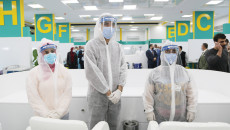Less than 20% of people in Kirkuk province have received the vaccine, according to a study conducted at the provincial level, 60% of those who did not receive the vaccine attributed the reason for fear of injections and the consequences of the vaccine.
Sabah Namiq, Director General of Health in the Kirkuk Health Office, declared that in a show on Al-Rashid Radio, as part of (Rooted in Trust), a project implemented by (Internews) in partnership with KirkukNow Media Outlet.
"The vaccination rate in Kirkuk has not reached 20% yet, which is very low compared to other countries and not at the level of our demand, because in some countries has hit 90%," Namiq said.
He stressed that health awareness is very important for citizens, and rumors have a direct impact. "For example, at first people did not believe in the spread of coronavirus at all.”
"According to our research with UNICEF, the first reason why people in Kirkuk did not receive the vaccine was because of fear of the effects of the vaccine, some of them believe in the vaccine, but said they were afraid of the injection," Namiq added.
"60% of those in Kirkuk do not receive the vaccine for these two reasons."
The first reason why people in Kirkuk did not receive the vaccine was fear of the effects of the vaccine, and some, although they believe in the vaccine, but said they were afraid of the injection
"The virus is now less active and effective than before, perhaps because people have already been infected with the virus, or received the vaccine, which has led to a kind of mass immunity," Namiq believes.
He assured people that the Covid-19 vaccination has no serious side effects.
"We see nowadays those tested positive are not infected severely, people cannot differentiate it with other diseases, for example, some of those who have colds and fevers, some of them may be coronavirus, but people test less and do not show up in hospitals.”
In December 2020, the Iraqi Minister of Health inaugurated al-Shifa 14 hospital, 150-bed center for treatment of COVID-19 patients in Kirkuk City, funded by charity organization belonging to the ‘Imam Hussein Holy Shrine’ chaired by Grand Ayatollah Ali al-Sistani, the leading spiritual leader of Shiite Muslims and the most senior scholars in Shia Islam.
The hospital, built over a 3,500 square meters area, has costed nearly half a billion Iraqi Dinars IQD (USD400,000). It consists of emergency, consulting clinic and intensive care units ICU.
Kirkuk has registered the first case of Covid-19 on February 25th, 2020 and up to April 5th, 2022, it has recorded about 90,000 infections, out of which 1,492 deaths.
Sabah Namiq, Director of Public Health in Kirkuk Health Office.
Regarding Covid vaccination, Namiq recalls, "when the Chinese vaccine (Sinopharm) arrived a year and a half ago, although there was a lot of fear of the disease, it was not warmly welcomed, when the Pfizer vaccine came gradually the turnout went up."
"Then people gradually got used to the disease and their fears were broken, which led to a decrease in demand for the vaccine, although there were many deaths and infections. This was unfortunate because the vaccine had proven to be effective," he elaborated.
"The activity and effectiveness of the vaccine prevented those infected from going to hospital. In general, the virus had little effect on them," he said.
The activity and effectiveness of the vaccine prevented those infected from being hospitalized
Regarding the rumors about Covid-19 and vaccination, Namiq confirmed, "There is a rumor that the vaccine will have a bad effect on those with chronic diseases. But I want to correct this, it is completely the opposite, because those with chronic diseases are more likely to contract the virus. The vaccine can protect them more. Vaccines are harmless.”
"So far, the thousands of vaccines given to citizens in Kirkuk, we have not seen any bad effects," he said.
"Although the vaccine is effective against all generations of coronavirus, but there is still a possibility of re-infection," he said.
"Get the vaccine, it protects you and your family, it protects the elderly in your family and it is very, very active and effective," he said.
Iraq has joined the race for the jab March 2021 when it has received 50,000 doses of Sinopharm vaccine manufactured by China.
Statistics obtained by KirkukNow from the Kirkuk Health Department show there are 90 vaccination centers throughout the province, including mobile teams and outlets to the Internally Displaced Persons IDP.
Iraq has administered over 11 million doses of Covid-19 up to early November. The country has registered 24 million positive cases and over 25,000 deaths since February 2020.





